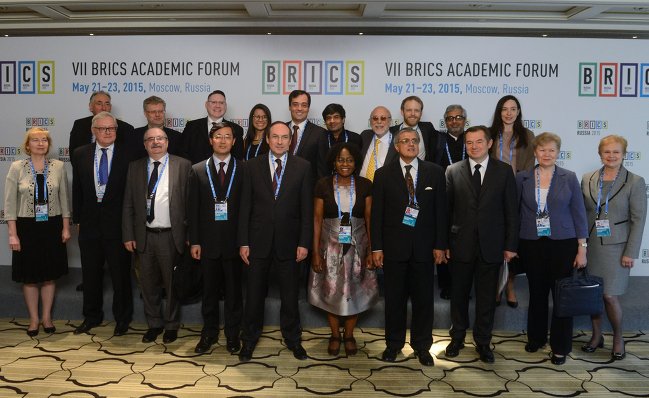
The VII BRICS Academic Forum submits development recommendations to the group’s leaders
The VII BRICS Academic Forum, which was held by the Russian National Committee on BRICS Research ahead of the Ufa summit, has approved recommendations for the BRICS leaders on the further growth and advancement of the group.
In July 2014, the five BRICS leaders instructed their expert communities to develop a long-term strategy for BRICS.
Over the past year, the BRICS Think Tanks Council (BTTC) has coordinated and submitted an analytical paper to the BRICS leaders that outlines the main areas of the five countries' long-term cooperation.
The Academic Forum in Moscow carried on the experts' work. Its final declaration includes recommendations on a wide range of issues such as BRICS' role in the global governance system, peace and security, economic strategy, sustainable development areas, further development of cooperation among BRICS countries, the possibility of BRICS' institution building and the group's image on the international stage.
The forum participants see BRICS as a new model of international relations based on equality and collective management. All of the five BRICS countries are the world's leading and systematically important economies. In this context, they emphasise the need for a broader representation of the rising economies in the system of global governance.
They pointed to the biggest financial and economic achievements of the BRICS countries such as the creation of the New Development Bank and the Contingent Reserve Arrangement. This year BRICS is expected to adopt an economic strategy that should turn the group into an effective cooperation mechanism in all areas of mutual interest, primarily power generation, industrial production, agriculture, healthcare and education. There are over 30 such areas in the BRICS roadmap.
The forum's final document comprises practical recommendations for promoting BRICS cooperation in security, industry, finance and trade, including in light of the BRICS countries' complementarity. The forum participants also proposed creating a BRICS virtual secretariat and expanding outreach relations with other countries and regional associations.
The BRICS experts also focused on peace and security. They pointed out that the BRICS countries should facilitate the adoption of a declaration of shared principles and adopt a new multilateral treaty on non-aggression and peaceful coexistence, which would be legally binding and open for signing by all members of the international community.
They also proposed considering the possibility of creating an interregional coordinating committee of regional security organisations, a BRICS advisory agency on new global, regional and local challenges.